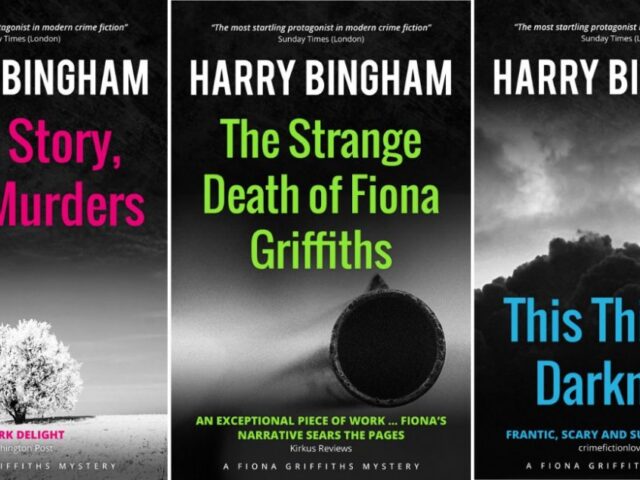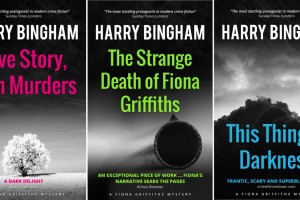Blimey.Somewhere in the world today, there’s a bloke who woke up with a bit of a cough … and later figured out that he (or she) was the person who introduced a new coronavirus to the world. A little thing leading to a big one.Well, last week, I muttered something about a change of subject: “Blah, blah. Let’s turn to your work. Blah, blah. Hey, why not upload something to Townhouse.”Yeah. Good idea, Harry. I was expecting a trickle, perhaps even a decent flow. Instead – a deluge. More than 400 of you commented on that Ocean of Jewels post (here), and there are more comments still coming in. And that’s great. Really fantastic.So.I’ve picked out five of your pieces and given proper comments. Oh yes, and this post is all aboiut editing, right? If you want to read our thoughts on how to edit your book, you will find them here. If you want a proper manuscript assessment from one of our superpowered editors, you can get it here.Right then.Five writers. Five pieces. Five sets of comments from me. Here goes:Evolution\'s Leap, by Ross CorriganScene: A failed attempt to track down a gifted individual:A bitter Swiss morning brought with it an overcast sky and the threat of further flurries. Earlier, snowflakes had tumbled and drifted in the headlights of passing cars, like fluttering white moths of frozen rain, and the accumulation had managed to drape a first winter jacket on the sloping shoulders of the town’s picturesque Alpine buildings. Well-heeled and suitably wrapped-up locals hurried by, though not before glancing and shaking their heads in dismay. The town of Zug was used to many things: Maserati drivers, Swiss and foreign directors of businesses domiciled in the local Canton, or state, and well-off tourists attracted to its pretty lakeside old town. What it wasn’t used to was a drive-by shooting of a foreign national—a young Chinese woman—right in front of the exclusive Park Hotel.Though the clothed body was obscured by the flapping, hastily erected cover, the corpse’s exposed head wasn’t. Disturbed by an ill-timed gust, the dead woman’s eyes stared lifelessly out towards the Metalli Shopping Mall. There was no doubting the cause of death. With the black humour typical of their secretive trade, the agents referred to it as lead poisoning—two shots: one to the chest, one to the centre of the forehead. My commentsThis is already good, and isn’t that far from really good.That final paragraph reads pretty much like a class piece of crime fiction. Good description of the corpse. Strong sense of place. Excellent bit of macabre police-humour at the end. (The one niggle in this paragraph has to do with a grammatical issue. The issue is that an adjective / adjectival phrase – “disturbed by an ill-timed gust” – is modifying the wrong thing. What the author wants us to think is that the cover over the corpse has been disturbed by an ill-timed gust. But grammatically, the sentence is saying that the dead woman’s eyes have been disturbed. I’m not normally one to fuss over grammar much, but the niggle in this case does create a tiny problem of comprehension, and those things are always bad.)But mostly, give or take a copy-editor’s slicing pen, that last para feels like crime fiction wonderfully well done.The first two paras – well, they’re almost there too. I’ve got one definite niggle there and one probable one.The definite one is that the first paragraph reverses on itself. So it describes the morning weather, then jumps back into the prior night (“Earlier, snowflakes had …”), then catches up again with well-heeled locals. And all this is by way of preamble to the actual corpse. I don’t mind time-reversals too much in principle, but when you put them into a preamble, it all ends up feeling a bit confusing and congested.So I’d definitely want to keep my timeline straightforward here: snow in the night, overcast morning, well-heeled locals, corpse. (And notice, by the way, that the author is slowly zooming in on the corpse. Going from large observations to increasingly specific ones, right on until you reach the dead woman’s eyes. That’s nice.)But I’d probably also want to take a sentence or two out of this. Without the broader context, it’s hard to say, but it felt maybe a little longer than necessary.Overall though: this feels like a book I’d like to read.Benjamin Tate Lives Among Us, by “Alan”The main character is a runner. Here, he is 18. His parents used to drive him to races, he now drives himself.It was different now that he had learned to drive. For the last few years he’d grown increasingly embarrassed to arrive at the track with his parents in tow. He was taller than his mother and stronger than his father. He’d walk in front or behind them, pretending to be alone, and then remain in the changing rooms a long time after his shower so there were fewer people to see them leave together. Eventually his parents began to withdraw. They no longer cheered loudly from the stands when he led down the straight, they kept their distance before races and waited for him in the car afterwards. Then one day his father handed him the keys and stood in the road with his mother watching him drive away. Ben had seen them in the rear-view mirror getting smaller and smaller.My commentsThis is really simple, and really strong. The best line here is the closing one about the parents getting smaller in the rear-view mirror. Because of the set-up in the first para, we know this isn’t just a comment about them receding into the distance. It’s also about them becoming a smaller factor in his racing life, and in his life generally.Another bit of skill here is the way the piece divides into three. First, some specific comments about the race track: walking in front, staying in the shower. That’s quite specific in focus. Quite close up. Then you have the bit that begins ‘His parents began to withdraw’. That withdrawal starts the process of exit. The parents are still at the track but physically distant. They are still in view of the camera, but this is a long shot, not a close up.And then, with the rear view mirror, the parents come to disappear completely – but the withdrawal (physical and metaphorical) has been going on all through this passage.No one sentence here reads like great writing, but this has the quiet skill of an Anne Tyler or an Elizabeth Strout. It’s class.Ascetic of the Sword, by ChimpledusFantasy short story about martial arts, mastery and obsession. The main character aspires to achieve \'the Perfect Cut\' in his swordsmanship but has severely injured himself in his narrow path to perfection.We continue in silence as the day brightens and golden rays gleam on the dewy rice stalks. I look at the age spots on the back of the monk’s head, waiting for him to ask a question.It does not come.“Venerable Father, I am sick,” I say.“Indeed? You look hale as a tiger. How are you sick?”“I…my body is sick. My hand shakes.”“So does mine.” The monk laughs gently. “I don’t see anything wrong with that.”“I cannot train. I am in pursuit of the Perfect Cut. I have attained it once, by accident, and I am unable to find it again. And now I am afraid I never will.”“Perhaps you are never meant to.”I pause. “Why?”“What is the Perfect Cut to you?”“The cut where the target is severed with such perfection that everything rings in harmony.”“Why do you seek it?”“Why train, if not to reach the epitome of skill?”My commentsI just like this! It has the feel of poetry. Very spare. Lots of clarity. The dialogue has just enough twistiness in it – an obliqueness to the turns of thought – to keep us interested, but never confused. If I was editing this, I’d just do one thing: I’d kill one of the adjectives in that first sentence. I’d probably take out ‘golden’ – my Perfect Cut.Untitled, by LizThis is the beginning of my ghost story set in the late 1950s on the border of England and Wales. The story starts 1st December 1956.And here I was, after a day of travelling and too many sleepless nights, back at the house where I had arrived as a newborn twenty-six years before. There was a neat symmetry to it, given the circumstances. Even in my exhaustion and misery I could appreciate the irony of a writer straying from her intended path in such a perfectly plotted, circular way. The thought was a useful distraction, if nothing else, as I climbed the last few yards towards the house, half-blinded by the stinging wind. The Black Hill was not a kind place on a December afternoon at the best of times, but winter had arrived early and resolute this year, storming down like an invasion from the north and blasting all traces of autumn away overnight. In London, fog had blunted the outlines of buildings and blurred the faces of passers-by, and I had moved from our rooms to the warmth of the library, on the tube, on buses, cushioned from the worst of the weather. Here, everything was sharp and cold. Gorse spiked above the rusty bracken. Hawthorns twisted spare, hoary branches towards the east. The bare mud of the track was frozen into jags. It was hard ground, even in the summer, with a meagre skin of soil over the old sandstone rock. My commentsThis feels like it wants a quick edit, but I know this part of the world well, and its physical details are beautifully nailed – right down to the hawthorns that have twisted, east-pointing branches. (The prevailing wind is from the west, and the mountain trees are all lop-sided.) Rather than make specific comments, though, I thought I’d just show you how I’d edit this piece, if it were mine. It’s already good though. What follows is just a wash-and-brush-up.:And here I was, after a day of travelling and too many sleepless nights, back at the house where I had arrived as a newborn twenty-six years before. There was a neat symmetry to it, given the circumstances. Even in my exhaustion, I could appreciate the irony of a writer straying from her intended path in such a perfectly plotted, circular way. The thought was a useful distraction, if nothing else.I climbed the last few yards towards the house. The Black Hill was not a kind place on a December afternoon at the best of times, but winter had arrived early and resolute this year, with a wind to tear away the last traces of autumn. My eyes streamed in the blast. In London, fog had blunted the outlines of buildings and blurred the faces of passers-by, and I had moved from our rooms to the warmth of the library, on the tube, on buses, cushioned from the worst of the weather. Here, everything was sharp and cold. Gorse spiked above the rusty bracken. Hawthorns twisted spare, hoary branches towards the east. The bare mud of the track was frozen into jags. It was hard ground, even in the summer, a meagre skin of soil over sandstone. Wishing on a Dream, by Patricia ThomsonNo intro – just “something I’ve been messing with for a while”.But we’re here in the States, playing some dates to make up for ones we had to cancel when visas got screwed up. Tonight was our first show in Hartford, Connecticut, and now we’re on our way to Sayreville, New Jersey. My hometown is about forty minutes south of there. We’ve played around New Jersey but never in it so this is being looked at as a homecoming show for me. I look out the bus window into the streetlight-lit darkness, knowing familiar sights are out there and wanting to see them, to be in territory I know for a change.Then I see it, and just like when I was a kid I perk up.The red and white and gold revolving neon sign above the Anheuser Busch bottling plant in Newark glows against the orange-tinged night sky. Seeing the stylized A with a bald eagle in flight behind it meant that we were exactly halfway between our house in Oceanville and Aunt Marie’s house in North Arlington. Not that there’s no reason to go to either anymore. Aunt Marie retired to Florida two years ago and I have better things to do than listen to my father go on about September eleventh being fake and why I’m running around Europe with a bunch of hippies. “Where I’m from, not where I live,” I say into the night.And no matter where I go, I never feel welcome.My commentsReally easy, simple, terrific writing. The scatter of placenames already anchor the narrative in place. The Anheuser Busch bottling plant seems like a brilliant marker of location too. That fine sense of place is matched by a nice sense of something like nostalgia – but more complex, because of the protagonist’s cautious self-distancing.That complex relationship to the past is threaded all the way through this snippet. (hometown … homecoming show … familiar sights … wanting to see them … no reason to go to either … better things to do than listen to my father.) That collection of thoughts and feelings prepares the ground for the character’s own two-sentence, two-para summary at the end. And even the summary feels unsettled: she’s not settled in the past, she’s got no new place to settle now.This is really strong stuff. My one real niggle? I think that compound word “streetlight-lit” should be run over by a steamroller and then pounded into dust. And then put on a rocket and fired at the sun.But this book has class written all over it. If I were an agent, I’d be salivating.That’s it from me. I’ll go back to these themes again next week. There’s a lot of meat here. I’ll also do my best to make these comment-athons a bit more regular. They’re clearly really working.I’ll shut up now. I am going to build a rocket, destination Sun. If you want to read more of these pieces, or to upload your own, then the Monster Upload thread is right here: https://community.jerichowriters.com/page/view-post?id=73 Till soonHarryPS: Oh heck. You don’t want a monster massive set of PSes. So I’m going to recycle this one from last week:1. Come to The Getting Published Day. Don’t fail to get published because you’re doing the basics wrong. We’ll tell you what to do and how to do it. Learn more.2. Come to our Self-Publishing Day. I love self-publishing. I think the modern Amazon- and ebook-led self-pub model has done more for authors than anything at all since the rise of literary agents. But if you self-publish, you have to do it right. We’ll tell you how.




















